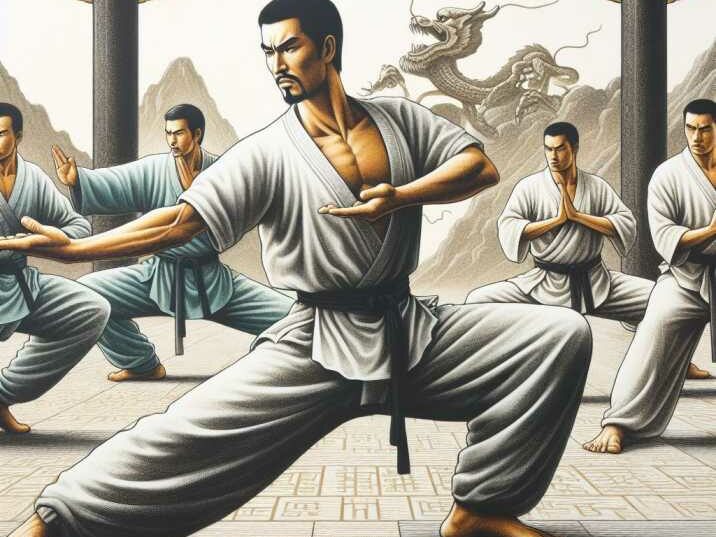Introduction:
Table of Contents
In today’s fast-paced world, the importance of instilling values like responsibility and accountability in individuals cannot be overstated. These qualities serve as the cornerstone of personal and societal success, guiding individuals towards making ethical decisions and taking ownership of their actions. While there are various avenues through which these virtues can be cultivated, one particularly impactful method is through the practice of Kung Fu, Kung Fu training cultivates responsibility and accountability. Originating from ancient China, Kung Fu is not just a martial art; it’s a way of life that emphasizes discipline, respect, and self-improvement. In this article, we delve into how Kung Fu training cultivates responsibility and accountability.
The Essence of Kung Fu:
Kung Fu, often depicted in popular culture through mesmerizing displays of acrobatics and combat prowess, is deeply rooted in philosophical principles. At its core, Kung Fu transcends mere physical techniques; it embodies a holistic approach to life that encompasses mental, emotional, and spiritual growth. Discipline lies at the heart of Kung Fu training, requiring practitioners to adhere to rigorous training regimens and uphold high standards of conduct. Through relentless practice and dedication, individuals learn to master their bodies and minds, fostering a sense of self-control and inner strength.
Kung Fu Training Cultivates Responsibility and Accountability:
Responsibility Through Practice:
One of the fundamental aspects of Kung Fu training is the cultivation of responsibility. As practitioners progress on their martial arts journey, they are entrusted with the knowledge and techniques passed down through generations. This responsibility extends beyond the training hall, as students are expected to apply the principles of Kung Fu in their daily lives. Whether it’s showing respect to others, maintaining discipline in their studies, or upholding moral values, Kung Fu instills a profound sense of duty towards oneself and society as a whole.
Accountability in Action:
In the world of Kung Fu, accountability is not merely a theoretical concept; it’s a lived experience. Practitioners are held accountable for their actions both on and off the training mat. Through sparring sessions and forms practice, individuals learn to take ownership of their mistakes and strive for continuous improvement. Moreover, the hierarchical structure within traditional Kung Fu schools fosters accountability, as students look up to their instructors for guidance and leadership. This mentor-student dynamic instills a sense of accountability to uphold the values of the martial arts community.
The Role of Mentorship:
Central to the journey of every Kung Fu practitioner is the guidance of experienced mentors. In traditional Kung Fu schools, instructors not only impart technical skills but also serve as role models for their students. Through their words and actions, mentors reinforce the importance of responsibility and accountability, setting a standard of excellence for their disciples to emulate. This mentorship dynamic Kung Fu training cultivates responsibility and accountability towards one’s teacher, as students strive to honor their instructor’s teachings through their dedication and conduct.

The Ripple Effect:
The impact of Kung Fu training extends far beyond the individual practitioner; it permeates through their interactions with others and their contributions to society. As individuals embody the principles of responsibility and accountability in their daily lives, they become agents of positive change within their communities. Whether it’s volunteering to help those in need, standing up against injustice, or serving as mentors to future generations, Kung Fu practitioners exemplify the transformative power of personal integrity and moral courage.
Table of Information Kung Fu Training Cultivates Responsibility and Accountability:
| Aspect | Description |
|---|---|
| Essence of Kung Fu | Philosophical principles, holistic approach to life |
| Responsibility | Adherence to training regimens, application in daily life |
| Accountability | Ownership of actions, learning from mistakes |
| Role of Mentorship | Guidance, role modeling, setting standards |
| Ripple Effect | Impact on communities, societal contributions |
Conclusion:
In conclusion, Kung Fu training cultivates responsibility and accountability. In a world characterized by uncertainty and complexity, the virtues of responsibility and accountability serve as beacons of light, guiding individuals towards a path of self-discovery and empowerment. Through the practice of Kung Fu, individuals not only hone their physical abilities but also cultivate the inner qualities that define their character. As we reflect on the profound impact of Kung Fu training, let us embrace the timeless wisdom of this ancient martial art and strive to become stewards of responsibility and accountability in our own lives.

Frequently Asked Questions (FAQs):
- What is Kung Fu?
- Kung Fu is a traditional Chinese martial art that emphasizes self-discipline, respect, and self-improvement through rigorous physical and mental training.
- How does Kung Fu instill responsibility?
- Kung Fu training instills responsibility by requiring practitioners to adhere to strict training regimens, uphold moral values, and apply the principles of the martial art in their daily lives.
- Why is accountability important in Kung Fu?
- Accountability is crucial in Kung Fu as it encourages practitioners to take ownership of their actions, learn from their mistakes, and strive for continuous improvement both on and off the training mat.
- What role do mentors play in Kung Fu training?
- Mentors in Kung Fu serve as experienced guides who not only impart technical skills but also instill values such as responsibility and accountability through their mentorship and example.
- How does Kung Fu training contribute to societal change?
- Kung Fu training empowers individuals to become agents of positive change within their communities by embodying the virtues of responsibility, accountability, and integrity in their interactions and contributions to society.


